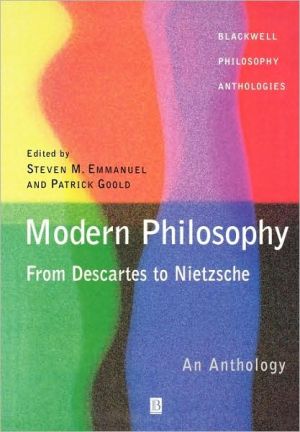

 |

|

The average rating for Modern Philosophy Anthology P based on 2 reviews is 3 stars.
Review # 1 was written on 2015-12-12 00:00:00 Angela McConville Angela McConvilleScience seems like it should be one of the last remaining narratives of continual, dependable forward progress. Concepts of progress in other fields get messy pretty quickly, where a gain on one side will often equates to a loss somewhere else, but science seems so much cleaner: we know more now than we did a hundred years ago, and a hundred years into the future we'll know more than we do now. I still think that story of development is predominantly true, but few things will muddy your view of how we get there more than some reading about the development of Renaissance science. I think popular perceptions of the Renaissance still tend to get tied up with ideas of the Enlightenment, and tell a story of a nascent, rationalist science that had to do battle for its existence against a relatively oppressive religion. Galileo would be this story's poster boy. But honestly, Renaissance science is weird. It's a strange amalgamation of magic, mysticism, and observation that defies any attempt to keep it within discernible or traditional boundaries. Two giant pushes towards the modern study of astronomy were that people were really fixated on astrology and that the Church needed a better calendar to calculate the date of Easter. Modern chemistry developed out of alchemy and its surrounding mysticism and eschatology. Copernicus, Kepler, and Newton were all deeply religious; Galileo's trial was about biblical exegesis more than it was about astronomy. The biggest patron of science at the time was probably the Church, and one of the biggest inspirations for thinkers of the age were ancient mystical texts. Giordano Bruno is one of the best examples of this context, and easily one of the most fun to read about. He was intelligent, imaginative, and deeply belligerent. His stubborn unorthodoxy got him expelled from multiple countries and repeatedly landed him in hot water. His personality, for me, it best summed up by his response when he was finally sentenced to the pyre by the Roman Inquisition: "You may be more afraid to bring that sentence against me than I am to accept it." I have no idea if that's apocryphal or not, but I'm going to assume it's real because man, that's quite the line. But as Bruno traversed Europe, he developed a cosmology that is both wacky and weirdly prescient. Bruno's universe picks up Copernicus and just runs with it, positing an infinite universe of infinite worlds, uniform in its composition, animated by the principles of thermodynamics. He also picked up the ancient theory of atomism, suggesting his infinite world was made up of an infinite number of infinitely small parts. Gatti's point in this book is that Bruno's ideas are at their core scientific, and often startlingly close to present questions and ideas floating around quantum theory, particularly the epistemological questions he raises about the possibility of knowing the infinitely big and the infinitely small. But at the same time, they aren't really scientific at all: Bruno never made an observation of his own, his atoms are all infused with souls, and a big part of his theory was metempsychosis (the transferring of souls to other bodies at death). Gatti's thesis of Bruno as scientist (or philosopher of science) stands in contrast to the famous thesis of Frances Yates's Giordano Bruno & Hermetic Tradition, which suggests Bruno wasn't a scientist at all but a big proponent of the revival of ancient magic and wisdom. The weirdest thing about all of it, though, is that it seems to be both of them at once, all the time. Bruno was a scientist. But he was also a theologian, a magician, a practitioner of Cabala. The 16th and 17th centuries were a weird time at which the universe had suddenly and abruptly become almost unimaginably bigger and the question of how to deal with that, to harness it or just to talk about it, seemed to permeate absolutely every aspect of thought. Some dealt with it primarily by appealing to mystic thought and secret avenues to wisdom. Some dealt with it by taking a closer, more systematic world immediately around them. The vast majority of them, however, did both to some extent, and I think it's great that scholarship is de-emphasizing the more traditional notion that these two approaches would be inherently incompatible. Gatti's book isn't perfect - I think she overemphasizes Bruno's scientific thought and undervalues his Hermetic ideas in the interest of countering Yates's thesis. I think some of her comparisons between Bruno and modern quantum mechanics can also be stretched a little thin at times. But at the same time, it's an absolutely fascinating read and it does a wonderful job of illustrating the epidemiological difficulties facing scientists and natural philosophers of the time. |
Review # 2 was written on 2014-11-13 00:00:00 James P Flynn James P FlynnLoved this book. If ever a text was imbued with the essence of Renaissance science, this would be that text. |
CAN'T FIND WHAT YOU'RE LOOKING FOR? CLICK HERE!!!